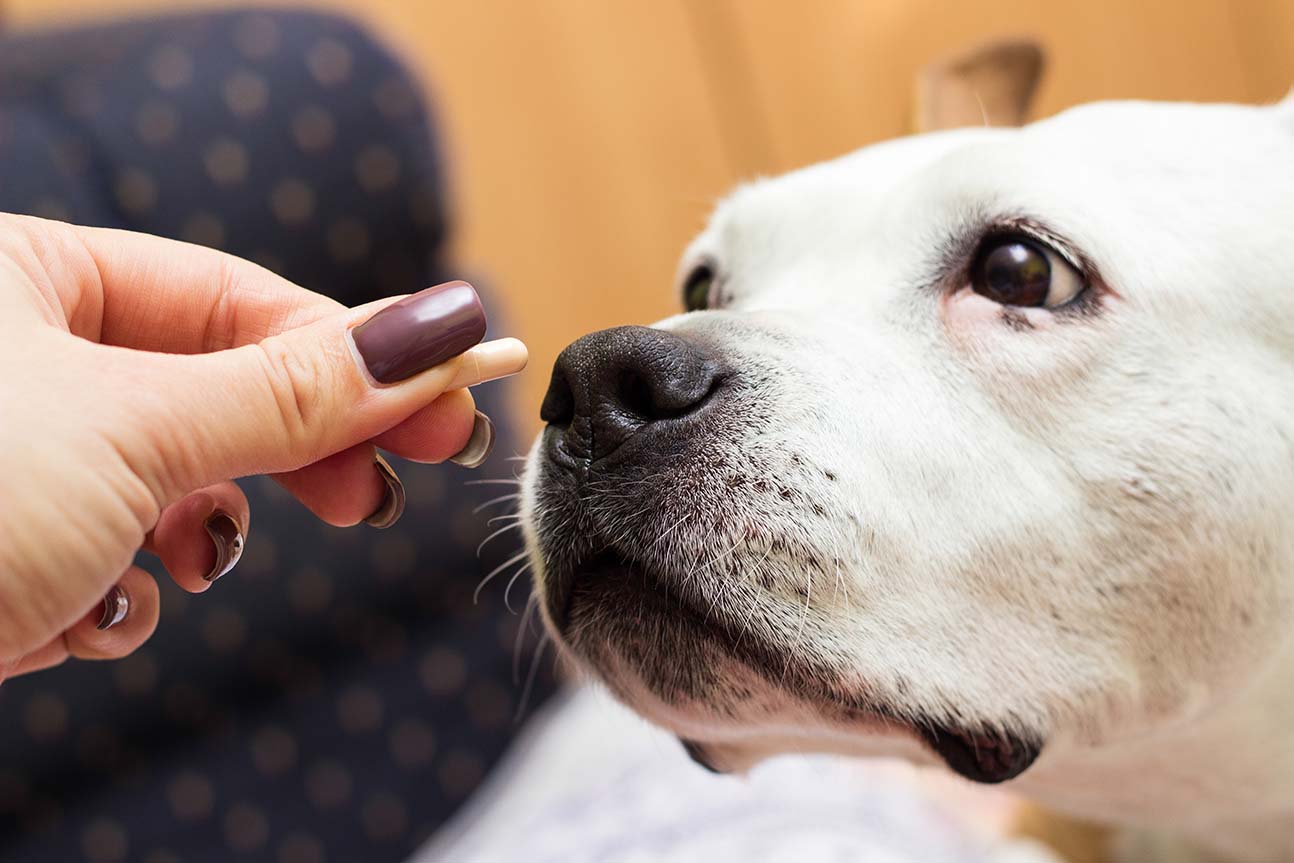Reviewed by Dr. Sarah Yosry
Updated on 26/04/2025
Reading time 4 min.
Overview
Severity: Low
Life stage: All
As a dog matures, its dietary requirements change, and they may need extra support to remain active, healthy, and at ease. Senior dogs can be helped by vitamins and a supplement just like their human contemporaries. These help nourish aging joints and improve immunity, cognitive function, as well as overall vitality. This informative article discusses the top vitamins for older dogs, how they benefit, as well as the time to visit a vet clinic to select a proper supplement program for your geriatric pet.
Senior Dogs Need Vitamins Because:
Aging results in changes to a dog’s metabolism, organ function, and immune system. When your dog becomes a senior (typically at age 7 for most breeds), they are likely to notice a decline in energy and susceptibility to illness and disease. These changes in physiology are:
• Poor nutrient absorption: The digestive system can be less effective, which can result in a deficiency of vitamins and minerals.
• Arthritis or joint stiffness: The cartilage starts to degenerate, leading to pain and limited motion.
• Cognitive impairment: Dogs may show signs resembling dementia, such as confusion and loss of orientation.
• Diminished immune system: Older canines are at a higher risk of infections and diseases.
• Muscle loss: Atrophy of muscle can result from aging, affecting strength and endurance.
• Loss of appetite: This may lead to a lower intake of nutrients through diet.
Vitamins can supplement these gaps in nutrition and ensure longevity as well as vitality. A visit to a veterinary clinic Dubai or a veterinarian nearby is necessary to determine if your dog requires supplements and how to give them safely.
Essential Vitamins for Senior Dogs
Vitamin A
Vitamin A is important for normal vision, especially night vision, as well as for immune system function and the regeneration of the skin. The capacity to absorb and process Vitamin A can be impaired with age in canines, so supplementing can be beneficial. It is also responsible for cell growth and the functioning of key organs like the heart and lungs.
Vitamin B Complex
The B-vitamin complex comprises several important nutrients: B1 (thiamine), B2 (riboflavin), B3 (niacin), B5 (pantothenic acid), B6, B7 (biotin), B9 (folic acid), and B12. They work collectively toward energy production, nerve function, cardiovascular function, and cerebral well-being. In older canines, B vitamins ensure mental alertness as well as mitigate the impact of cognitive aging. B12, especially, promotes red blood cell formation as well as neurological function.
Vitamin C
Though dogs can naturally produce Vitamin C, it may diminish with age or stress. Supplemental Vitamin C has antioxidant properties that minimize inflammation and help to bolster the immune system. It assists in repairing tissues as well as perhaps alleviating arthritis and other inflammatory ailments prevalent in older breeds.
Vitamin D
Vitamin D is responsible for keeping the level of calcium and phosphorus balanced, thus ensuring healthy bones as well as teeth. A deficiency of this vitamin can contribute to bone disease as well as muscular weakness. An overdose of Vitamin D is also poisonous, hence it must be supplemented under the guidance of a vet clinic Dubai or another professional veterinarian.
Vitamin E
Vitamin E is a potent antioxidant that supports immune function, skin and coat condition, as well as cognitive function. It is particularly beneficial for a dog that has degenerative joint disease or memory issues related to aging. It can also provide healthier cardiovascular function as well as cellular protection from oxidative degradation.
Omega-3 Fatty Acid
Though not technically a vitamin, Omega-3 fatty acids like EPA and DHA are essential for older dogs. Present in fish oil, Omega-3s are anti-inflammatory, good for brain function, and heart function, as well as joint performance. They are a standard inclusion in older dog supplement formulas and are well-known for their ability to make coats shine and minimize shedding.
Specialty Supplements for Senior Dogs
Aside from basic vitamins, other supplements are specifically formulated for certain age-related ailments:
Glucosamine and Chondroitin
These compounds are responsible for preserving joint health and mobility. Glucosamine supports the formation of cartilage, and chondroitin prevents its destruction. They help to ease the symptoms of arthritis and joint pain, enhancing your dog’s mobility as well as comfort.
Probiotics
Probiotics help improve the intestinal environment by regulating the digestive flora, which decline with age. They enhance nutrient uptake, minimize gastrointestinal discomfort, and provide immune system assistance. Sensitive stomach, irregular bowel habits, and chronic digestive disorders are alleviated by probiotics.
L-Carnitine
L-Carnitine is a nutrient that plays a role in fat metabolism and supports lean muscle mass. It is especially useful for older, overweight, or inactive dogs that are at risk of muscle wasting or cardiovascular disease.
Coenzyme Q10
This antioxidant supports cellular energy production and heart function. It’s often used for older dogs with cardiovascular disease or overall lethargy. It may also exhibit neuroprotectant qualities, helping to prevent cognitive decline as a dog ages.
The professionals in your local pet clinic or veterinary clinic can recommend the most suitable mix of the above supplements according to a comprehensive checkup.
Signs Your Senior Dog Might Need Supplements
Identifying when your dog can be helped by supplementation is key to intervening early. Look out for these signs:
• Loss of energy or stamina: If your dog is less interested in walking, playing, or climbing.
• Cognitive decline: Signs include wall staring, forgetting daily routines, or being confused.
• Stiffness in joints: Arthritis can be signaled by a reluctance to jump up from a resting position.
• Skin coat dullness or skin problems: Dryness, dandruff, and hair loss may be indicative of a deficiency.
• Digestive issues: Bloating, diarrhea, inconsistent stools, or gas are indicative of a digestive imbalance.
• Frequent infections: A compromised immune system may cause more frequent illness or a longer recovery.
If your dog shows any of these signs, arrange a visit with a vet close to you or vets close to you to assess their dietary and supplement requirements.
How to Choose the Right Supplement
First Consult a Vet
Not all older dogs require supplements. A thorough assessment at a veterinary clinic or the veterinary hospital must be done to assess if a supplement is indicated and what kind is most beneficial to your dog’s individual needs.
Seek Out Quality Ingredients
Use products that are by well-known companies employing high-quality ingredients. Supplements must be made by facilities adhering to good manufacturing practices (GMP) and be third-party tested. Your veterinarian can assist in identifying credible brands.
Think about Your Dog’s Individual Needs
Tailor your supplements according to your dog’s personal health issues:
• Dog joint support for arthritis
• Antioxidants for brain health
• Support for digestive ailments
• Supplements for a disease-sensitive breed
Discuss with your veterinary clinic Dubai for the most effective and safest course of action.
Monitor for Side Effects
New supplements must be closely monitored. Potential side effects to be on the lookout for include vomiting, changes in appetite, diarrhea, or greater lethargy. If any are experienced, stop the supplement and contact your pet clinic at once.
Common Myths About Dog Supplements
Myth 1: “Natural is safe.” Natural ingredients can also interact with medications or trigger side effects. It is wise to consult a veterinarian’s advice prior to the use of a supplement.
Myth 2: “All dogs require supplements.” Supplements are only necessary for those with particular deficiencies or illnesses. Supplementing unnecessarily can cause more harm.
Myth 3: “Human vitamins are safe for canines.” Human preparations may include toxic levels of specific vitamins or artificial sweeteners such as xylitol.
A professional at your local vet clinic or veterinary hospital is your best place to go for advice.
Conclusion: Support Your Senior Dog’s Health with Expert Care
As your dog grows older, supplementing them with the correct vitamins can be a game-changer in their overall quality of life. From joint support to immune system strength and cognitive well-being, a balanced blend of essentials keeps your pet active, alert, and happy.
For a customized supplement plan as well as professional guidance, consider Modern Vet, your top Dubai vet clinic. With highly experienced veterinarians as well as cutting-edge technology, Modern Vet is your premier veterinary clinic Dubai for older pet care.
Whether you are looking for a “vet clinic near me” or a reputable veterinary hospital, Modern Vet provides compassionate, professional care at every stage of your dog’s life.
Book an appointment today at Modern Vet and provide your older dog with the golden years they deserve.
Share this, choose your platform!
Writen by
Dr.Sarah Yosry
DVM
A product of a rich Australian/Egyptian heritage, Dr. Sarah Yosry stands as a testament to the union of diverse cultures and a shared love for animals.



